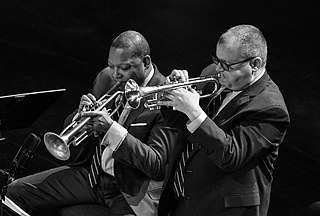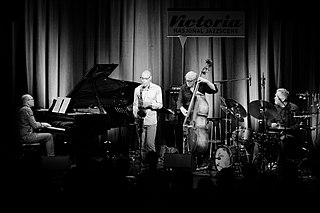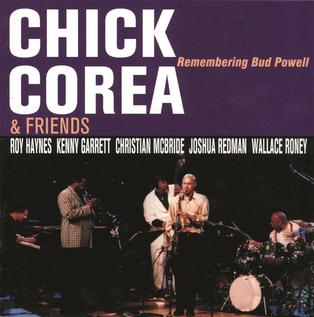Jazz is a music genre that originated in the African-American communities of New Orleans, Louisiana, in the late 19th and early 20th centuries, with its roots in blues and ragtime. Since the 1920s Jazz Age, it has been recognized as a major form of musical expression in traditional and popular music. Jazz is characterized by swing and blue notes, complex chords, call and response vocals, polyrhythms and improvisation. Jazz has roots in European harmony and African rhythmic rituals.

Bebop or bop is a style of jazz developed in the early-to-mid-1940s in the United States. The style features compositions characterized by a fast tempo, complex chord progressions with rapid chord changes and numerous changes of key, instrumental virtuosity, and improvisation based on a combination of harmonic structure, the use of scales and occasional references to the melody.

Hard bop is a subgenre of jazz that is an extension of bebop music. Journalists and record companies began using the term in the mid-1950s to describe a new current within jazz that incorporated influences from rhythm and blues, gospel music, and blues, especially in saxophone and piano playing.

Lou Donaldson is an American retired jazz alto saxophonist. He is best known for his soulful, bluesy approach to playing the alto saxophone, although in his formative years he was, as many were of the bebop era, heavily influenced by Charlie Parker.

Tadley Ewing Peake Dameron was an American jazz composer, arranger, and pianist.

Cool jazz is a style of modern jazz music that arose in the United States after World War II. It is characterized by relaxed tempos and lighter tone, in contrast to the fast and complex bebop style. Cool jazz often employs formal arrangements and incorporates elements of classical music. Broadly, the genre refers to a number of post-war jazz styles employing a more subdued approach than that found in other contemporaneous jazz idioms. As Paul Tanner, Maurice Gerow, and David Megill suggest, "the tonal sonorities of these conservative players could be compared to pastel colors, while the solos of [Dizzy] Gillespie and his followers could be compared to fiery red colors."
"Hot House" is a bebop standard, composed by American jazz musician Tadd Dameron in 1945. Its harmonic structure is identical to Cole Porter's "What Is This Thing Called Love?". The tune was made famous by Dizzy Gillespie and Charlie Parker as a quintet arrangement and become synonymous with those musicians; "Hot House" became an anthem of the Be-bop movement in American jazz. The most famous and referred to recording of the tune is by Parker and Gillespie on the May 1953 live concert recording entitled Jazz at Massey Hall, after previously recording it for Savoy records in 1945 and at Carnegie Hall in 1947. The tune continues to be a favorite among jazz musicians and enthusiasts:

Straight-ahead jazz is a genre of jazz that developed in the 1960s, with roots in the prior two decades. It omits the rock music and free jazz influences that began to appear in jazz during this period, instead preferring acoustic instruments, conventional piano comping, walking bass patterns, and swing- and bop-based drum rhythms.

Neo-bop refers to a style of jazz that gained popularity in the 1980s among musicians who found greater aesthetic affinity for acoustically based, swinging, melodic forms of jazz than for free jazz and jazz fusion that had gained prominence in the 1960s and 1970s. Neo-bop is distinct from previous bop music due to the influence of trumpeter Wynton Marsalis, who popularized the genre as an artistic and academic endeavor opposed to the countercultural developments of the beat generation.

Babs Gonzales, born Lee Brown, was an American bebop vocalist, poet, and self-published author. His books portrayed the jazz world that many black musicians struggled in, portraying disk jockeys, club owners, liquor, drugs, and racism. "There are jazz people whose influence can be described as minor," wrote Val Wilmer, "yet who are well-known to musicians and listeners alike ... You'd have to be hard-pressed to ignore the wealth of legend that surrounds Babs Gonzales." Jazz writer Jack Cooke explained that Gonzales "assumed the role of spokesman for the whole hipster world... [becoming] something more than just a good and original jazz entertainer: the incarnation of a whole social group."

News for Lulu is an album of hard bop compositions performed by saxophonist John Zorn, trombonist George Lewis and guitarist Bill Frisell.

To Be or Not to Bop: Memoirs of Dizzy Gillespie is a 1979 book written by jazz musician, composer and band leader Dizzy Gillespie. The book was released in July 1979 by Doubleday. The University of Minnesota Press re-released the book in 2009.
The Cowboy Bebop anime series was accompanied by a number of soundtrack albums composed by Yoko Kanno and Seatbelts, a diverse band Kanno formed to create the music for the series, with a principal focus in jazz. The soundtrack was released in the American market by Victor Entertainment, a subsidiary of JVC Kenwood.

Reincarnation of a Love Bird is an album by Paul Motian, released on the German JMT label in 1994. It contains performances of bebop jazz standards by Motian with the Electric Bebop Band. The album follows on from the 1992 release Paul Motian and the Electric Bebop Band, and was rereleased on the Winter & Winter label in 2005. The band features Motian with saxophonists Chris Potter and Chris Cheek, guitarists Wolfgang Muthspiel and Kurt Rosenwinkel, bass guitarist Steve Swallow and percussionist Don Alias.

Europe is an album by Paul Motian and the Electric Bebop Band released on the German Winter & Winter label in 2000. The album is the group's fifth release, following Paul Motian and the Electric Bebop Band (1992), Reincarnation of a Love Bird (1995), Flight of the Blue Jay (1997) and Play Monk and Powell (1998). The band includes saxophonists Chris Cheek and Pietro Tonolo, guitarists Ben Monder and Steve Cardenas, and bass guitarist Anders Christensen.
"Our Delight" is a 1946 jazz standard, composed by Tadd Dameron. It is considered one of his best compositions along with "Good Bait", "Hot House", "If You Could See Me Now", and "Lady Bird". It has an AABA construction. A moderately fast bebop song, it featured the trumpeter Fats Navarro, who is said to "exhibit mastery of the difficult chord progression". One author said, "'Our Delight' is a genuine song, a bubbly, jaggedly ascending theme that sticks in one's mind, enriched by harmonic interplay between a flaming trumpet section led by Dizzy, creamy moaning reeds and crooning trombones. The written accompaniments to the solos-in particular the leader's two statements-are full of inventiveness, creating call-and-response patterns and counter-melodies. What is boppish here is the off-center, syncopated melody, as well as the shifting, internal voicings of the chords, especially at the very end. These voicings, along with a love of tuneful melodies that one walks out of a jazz club humming, were Tadd's main legacy to such composers and arrangers as Benny Golson, Gigi Gryce, and Jimmy Heath." Rolling Stone describes it as a "bop gem". The first publication is by Dizzy Gillespie in August 1946. In total there are more than 120 covers of Our Delight. Bill Evans recorded his version of it for his debut album New Jazz Conceptions in 1956.

BeBopBeBopBeBopBeBop is an album of bebop standards by pianist Paul Bley recorded in Denmark in 1989 and released on the SteepleChase label.

Remembering Bud Powell is an album by pianist Chick Corea and Friends performing tunes by Bud Powell. It was released on Corea's Stretch label in 1997.

Presenting... Jackie McLean, also referred to as The New Tradition and Jackie McLean Quintet, is the debut album by American alto saxophonist Jackie McLean, which was recorded in 1955, becoming the first LP released by the Ad Lib label before being reissued on the Jubilee label in 1958. It features McLean in a quintet with trumpeter Donald Byrd, pianist Mal Waldron, bassist Doug Watkins and drummer Ron Tucker.













